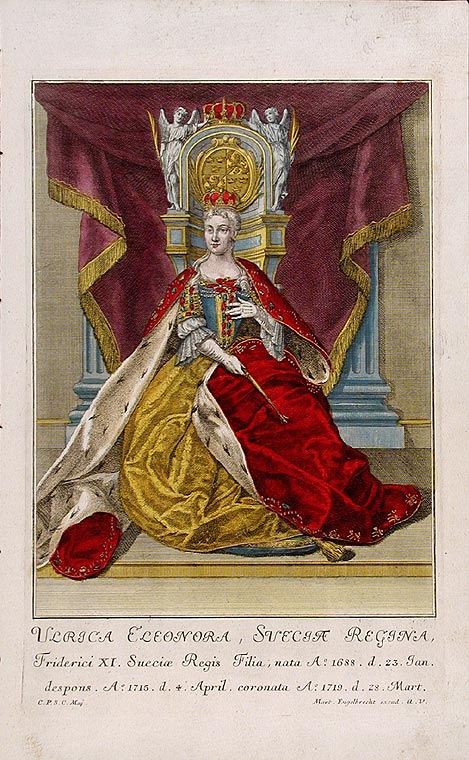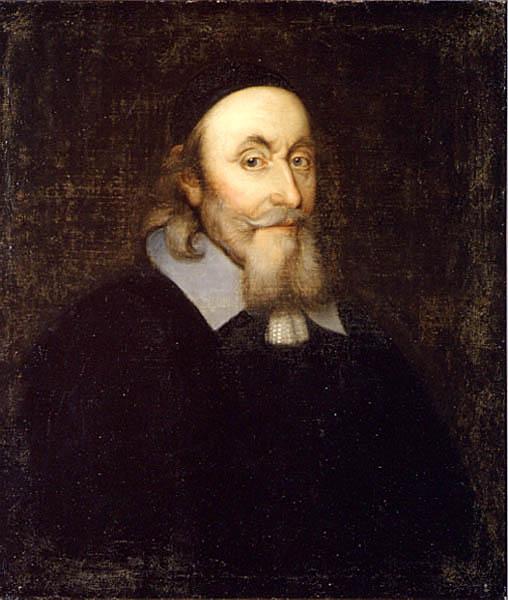|
Instrument Of Government (1719)
The 1719 Instrument of Government () adopted on 21 February 1719 by the Riksdag of the Estates (Swedish parliament), was the constitution of the Kingdom of Sweden from 1719 to 1720. Although only in force for a few months, it has great significance in Swedish history, as its promulgation marked the end of the country's first period of absolutism (1680-1719) and the beginning of the period of constitutional monarchy and parliamentary government traditionally known as the Age of Liberty. The Instrument came about as a result of the succession crisis which occurred after Charles XII of Sweden died childless during the Great Northern War, leaving two potential heirs: his sister Ulrika Eleonora the Younger, and his nephew Charles Frederick, Duke of Holstein-Gottorp. The crisis was eventually resolved by a deal whereby the Riksdag acknowledged Ulrika as queen regnant, and in exchange she signed a new constitution, thereby renouncing the absolute monarchy instituted by her father ... [...More Info...] [...Related Items...] OR: [Wikipedia] [Google] [Baidu] |
Martin Engelbrecht Ulrika Eleonora
Martin may refer to: Places Antarctica * Martin Peninsula, Marie Byrd Land * Port Martin, Adelie Land * Point Martin, South Orkney Islands Europe * Martin, Croatia, a village * Martin, Slovakia, a city * Martín del Río, Aragón, Spain * Martín River, a tributary of the Ebro river in Spain * Martin (Val Poschiavo), Switzerland England * Martin, Hampshire * Martin, Kent * Martin, East Lindsey, Lincolnshire, a hamlet and former parish * Martin, North Kesteven, Lincolnshire, a village and parish * Martin Hussingtree, Worcestershire * Martin Mere, a lake in Lancashire ** WWT Martin Mere, a wetland nature reserve that includes the lake and surrounding areas North America Canada * Rural Municipality of Martin No. 122, Saskatchewan, Canada * Martin Islands, Nunavut, Canada United States * Martin, Florida * Martin, Georgia * Martin, Indiana * Martin, Kentucky * Martin, Louisiana * Martin, Michigan * Martin, Nebraska * Martin, North Dakota * Martin, Ohio * Martin, South Caro ... [...More Info...] [...Related Items...] OR: [Wikipedia] [Google] [Baidu] |
Charles XI Of Sweden
Charles XI or Carl (; ) was List of Swedish monarchs, King of Sweden from 1660 until his death, in a period of History of Sweden, Swedish history known as the Swedish Empire (1611–1721). He was the only son of King Charles X Gustav of Sweden and Hedwig Eleonora of Holstein-Gottorp. His father died when he was four years old, so Charles was educated by his governors until his coronation at the age of seventeen. Soon afterward, he was forced out on military expeditions to secure the recently acquired dominions of Sweden, dominions from Denmark-Norway, Danish troops in the Scanian War. Having successfully fought off the Danes, he returned to Stockholm and engaged in correcting the country's neglected political, financial, and economic situation. He managed to sustain peace during the remaining 20 years of his reign. Changes in finance, commerce, national maritime and land armaments, judicial procedure, church government, and education emerged during this period. Charles XI was s ... [...More Info...] [...Related Items...] OR: [Wikipedia] [Google] [Baidu] |
Defunct Constitutions
{{Disambiguation ...
Defunct may refer to: * ''Defunct'' (video game), 2014 * Zombie process or defunct process, in Unix-like operating systems See also * * :Former entities * End-of-life product * Obsolescence Obsolescence is the process of becoming antiquated, out of date, old-fashioned, no longer in general use, or no longer useful, or the condition of being in such a state. When used in a biological sense, it means imperfect or rudimentary when comp ... [...More Info...] [...Related Items...] OR: [Wikipedia] [Google] [Baidu] |
Constitution Of Sweden
The Basic Laws of Sweden () are the four constitutional laws of the Kingdom of Sweden that regulate the Swedish political system, acting in a similar manner to the constitutions of most countries. These four laws are: the Instrument of Government (), the Freedom of the Press Act (), the Fundamental Law on Freedom of Expression () and the Act of Succession (). Together, they constitute a basic framework that stands above other laws and regulation, and also define which agreements are themselves above normal Swedish law. The Parliament Act () is usually considered to be halfway between a fundamental law and a normal law, with certain main chapters afforded similar protections as the fundamental laws while other additional chapters require only a simple parliamentary majority in order to be amended. To amend or to revise a fundamental law, the Riksdag needs to approve the changes twice in two successive terms with simple majorities, with a general election having been held in betw ... [...More Info...] [...Related Items...] OR: [Wikipedia] [Google] [Baidu] |
1719 In Law
Events January–March * January 8 – Carolean Death March begins: A catastrophic retreat by a largely-Finnish Swedish- Carolean army under the command of Carl Gustaf Armfeldt across the Tydalen mountains in a blizzard kills around 3,700 men and cripples a further 600 for life. * January 23 – The Principality of Liechtenstein is created, within the Holy Roman Empire. * February 3 (January 23 Old Style) – The Riksdag of the Estates recognizes Ulrika Eleonora's claim to the Swedish throne, after she has agreed to sign a new Swedish constitution. Thus, she is recognized as queen regnant of Sweden. * February 20 – The first Treaty of Stockholm is signed. * February 28 – Farrukhsiyar, the Mughal Emperor of India since 1713, is deposed by the Sayyid brothers, who install Rafi ud-Darajat in his place. In prison, Farrukhsiyar is strangled by assassins on April 19. * March 6 – A serious earthquake (estimated magnitude >7) in El Salvador results in large fractures ... [...More Info...] [...Related Items...] OR: [Wikipedia] [Google] [Baidu] |
Studentlitteratur .
Studentlitteratur is an academic publishing company based in Sweden and publishing mostly in Swedish. It is one of the largest producers of university text books and course books in Sweden. The company was established in 1963 and is based in the university city of Lund Lund (, ;"Lund" (US) and ) is a city in the provinces of Sweden, province of Scania, southern Swed ... References External links *'Official website '' Book publishing company imprints Book publishing ... [...More Info...] [...Related Items...] OR: [Wikipedia] [Google] [Baidu] |
Self-coup
A self-coup, also called an autocoup () or coup from the top, is a form of coup d'état in which a political leader, having come to power through legal means, stays in power illegally through the actions of themselves or their supporters. The leader may dissolve or render powerless the national legislature and unlawfully assume extraordinary powers. Other measures may include annulling the constitution, suspending civil courts, and having the head of government assume dictatorial powers. From 1946 to the beginning of 2021, an estimated 148 self-coup attempts took place, 110 in autocracies and 38 in democracies. List of self-coups * : President Louis-Napoléon Bonaparte ( December 2, 1851) * : President Juan Lindolfo Cuestas (February 10, 1898) * : Chancellor Engelbert Dollfuss ( March 15, 1933) * : Chancellor Adolf Hitler ( March 23, 1933 / August 2, 1934) * : President Gabriel Terra (March 31, 1933) * : Prime Minister in duties of the State Elder Konstantin Päts ( M ... [...More Info...] [...Related Items...] OR: [Wikipedia] [Google] [Baidu] |
Gustav III Of Sweden
Gustav III (29 March 1792), also called ''Gustavus III'', was King of Sweden from 1771 until his assassination in 1792. He was the eldest son of King Adolf Frederick and Queen Louisa Ulrika of Sweden. Gustav was a vocal opponent of what he saw as the abuse of political privileges seized by the nobility since the death of King Charles XII in the Great Northern War. Seizing power from the government in a coup d'état, called the Swedish Revolution, in 1772, that ended the Age of Liberty, he initiated a campaign to restore a measure of royal autocracy. This was completed by the Union and Security Act of 1789, which swept away most of the powers exercised by the Swedish Riksdag of the estates during the Age of Liberty, but at the same time it opened up the government for all citizens, thereby breaking the privileges of the nobility. A believer in enlightened absolutism, Gustav spent considerable public funds on cultural ventures, which were controversial among his critics, as ... [...More Info...] [...Related Items...] OR: [Wikipedia] [Google] [Baidu] |
Instrument Of Government (1720)
The 1720 Instrument of Government () adopted on 2 May 1720 by the Riksdag of the Estates (Swedish parliament), was the constitution of the Kingdom of Sweden from 1720 to 1772, and was thus in force for almost the entirety of the period of constitutional monarchy known as the Age of Liberty, having replaced the largely identical Instrument of Government (1719). The decision to enact a new constitution so soon after the previous one was prompted by the decision of Queen Ulrika Eleonora to abdicate in favour of her husband Frederick of Hesse, who thus became King Frederick I. The Riksdag disapproved of this manoeuvre and suspected Frederick of having ambitions of restoring absolute monarchy, and so in exchange for ratifying his accession as king it forced him to accept a new constitution, which imposed tighter restrictions upon royal power than its predecessor. In most respects, however, the 1720 Instrument was identical to that of 1719. The 1720 Instrument of Government remaine ... [...More Info...] [...Related Items...] OR: [Wikipedia] [Google] [Baidu] |
Administration (government)
The term administration, as used in the context of government, differs according to the jurisdiction under which it operates. In general terms, the administration can be described as a decision-making body. United States In Americans, American usage, the term generally refers to the Federal government of the United States#Executive branch, executive branch under a specific President of the United States, president (or Governor#United States, governor, Mayor#United States, mayor, or other local executives); or the term of a particular executive; for example: "President Y's administration" or "Secretary of Defense X during President Y's administration." It can also mean an executive branch agency headed by an administrator, as the NASA, National Aeronautics and Space Administration (NASA), Small Business Administration or the National Archives and Records Administration. The term "administration" has been used to denote the executive branch in presidential systems of government. ... [...More Info...] [...Related Items...] OR: [Wikipedia] [Google] [Baidu] |
Nordisk Familjebok
(, 'Nordic Family Book') is a Swedish language, Swedish encyclopedia that was published in print from between 1876 and 1993, and that is now fully available in digital form via Project Runeberg at Linköping University. The public domain editions of the encyclopedia remain important reference works in Finland, especially on Finnish Wikipedia. History First edition began when Halmstad publisher hired an editor, linguist , in 1874 to publish a six-volume encyclopedia. Linder drew up a plan for the work, designed the editorial team and created a large circle of experts and literary figures, who submitted article proposals and wrote and reviewed them. Under Linder's direction, the articles were then edited to make them as formal, consistent and accurate as possible. Much attention was paid to Nordic subjects, mainly Swedish and Finnish, where sources and models were often lacking, so extensive and time-consuming pioneering work had to be done. As a result, the earlier plan f ... [...More Info...] [...Related Items...] OR: [Wikipedia] [Google] [Baidu] |
Instrument Of Government (1634)
The Instrument of Government () of 1634 was a document describing the form and operation of the Swedish government, retrospectively regarded as the country's first constitution, although it was not intended to function as such.Regeringsformen '''' (1915), p.1207 It was composed by the Lord High Chancellor, , and was adopted by the |





